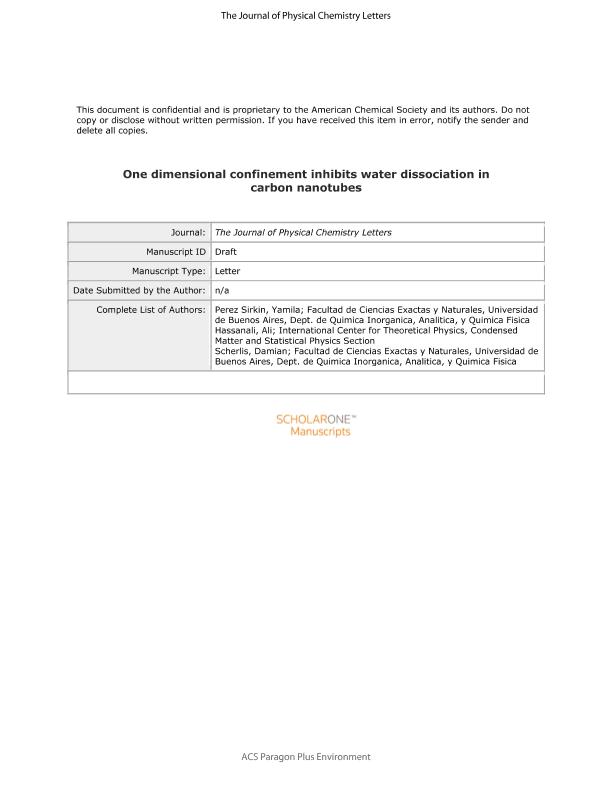Artículo
One-Dimensional Confinement Inhibits Water Dissociation in Carbon Nanotubes
Fecha de publicación:
09/2018
Editorial:
American Chemical Society
Revista:
Journal of Physical Chemistry Letters
ISSN:
1948-7185
Idioma:
Inglés
Tipo de recurso:
Artículo publicado
Clasificación temática:
Resumen
The effect of nanoconfinement on the self-dissociation of water constitutes an open problem whose elucidation poses a serious challenge to experiments and simulations alike. In slit pores of width ?1 nm, recent first-principles calculations have predicted that the dissociation constant of H2O increases by almost 2 orders of magnitude [ Muñoz-Santiburcio and Marx, Phys. Rev. Lett. 2017, 119, 056002 ]. In the present study, quantum mechanics?molecular mechanics simulations are employed to compute the dissociation free-energy profile of water in a (6,6) carbon nanotube. According to our results, the equilibrium constant Kw drops by 3 orders of magnitude with respect to the bulk phase value, at variance with the trend predicted for confinement in two dimensions. The higher barrier to dissociation can be ascribed to the undercoordination of the hydroxide and hydronium ions in the nanotube and underscores that chemical reactivity does not exhibit a monotonic behavior with respect to pore size but may vary substantially with the characteristic length scale and dimensionality of the confining media.
Palabras clave:
Free energy
,
Umbrella sampling
,
QM-MM
,
Molecular dynamics
Archivos asociados
Licencia
Identificadores
Colecciones
Articulos(INQUIMAE)
Articulos de INST.D/QUIM FIS D/L MATERIALES MEDIOAMB Y ENERGIA
Articulos de INST.D/QUIM FIS D/L MATERIALES MEDIOAMB Y ENERGIA
Citación
Pérez Sirkin, Yamila Anahí; Hassanali, Ali; Scherlis Perel, Damian Ariel; One-Dimensional Confinement Inhibits Water Dissociation in Carbon Nanotubes; American Chemical Society; Journal of Physical Chemistry Letters; 9; 17; 9-2018; 5029-5033
Compartir
Altmétricas




